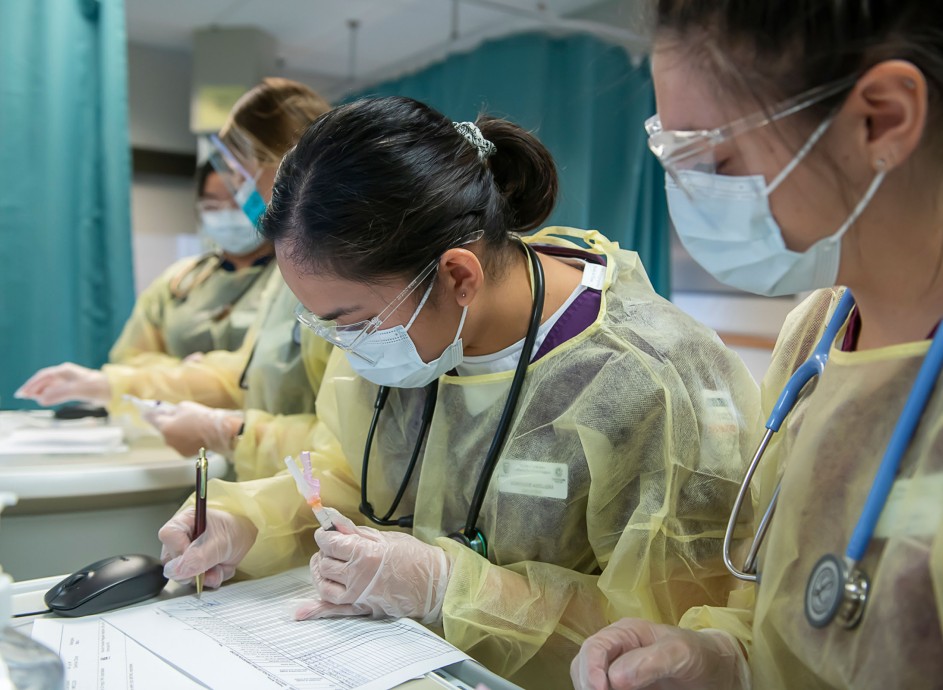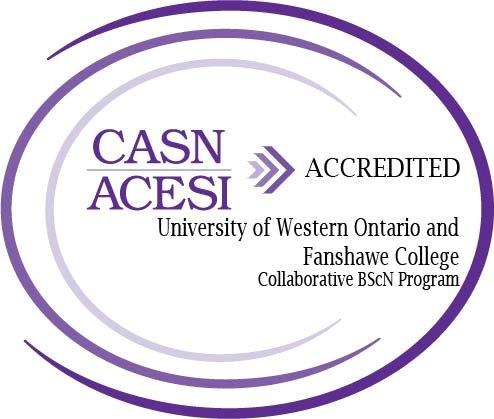Collaborative Nursing

*Domestic applicants include Canadian citizens, permanent residents, protected persons and Convention refugees.
The Collaborative Nursing program is an accredited four-year degree between Fanshawe College and Western University, leading to a Bachelor of Science in Nursing Degree (BScN). Graduates are eligible to apply for registration as a registered nurse with the College of Nurses of Ontario.
You’ll study for two years at Fanshawe and two at Western University learning from experienced nurses who have worked in busy emergency rooms and doctor’s offices; professionals who know the ropes and are eager to pass on their knowledge.
You’ll learn by working collaboratively and cooperatively with faculty in a state-of-the-art clinical education suite. This program also utilizes simulation learning. Learn more about our simulation labs.
You’ll complete a 12-week clinical placement in your final term where you’ll partner with a registered nurse in one of London's exceptional health care facilities.
The curriculum emphasizes a broad perspective of health and healing, health promotion and the ethic of caring. It takes into account health care needs in society and a changing health care system. The program educates nurses to work with individuals, families, groups and communities in diverse settings, enabling students to develop sensitivity to peoples' diverse experiences with health, healing and illness. Students learn to work in partnership with clients and inter-professional health care providers, while actively participating in their own learning.
When you graduate, you’ll be eligible to write the National Council Licensure Examination for Registered Nurses (NCLEX-RN) – the entry-to-practice to become registered with the College of Nurses of Ontario –giving you the ability to work in a healthcare facility anywhere in the province.
For admission questions, please book an appointment with the Collaborative Nursing advisor at Western.

The School of Nursing is fully accredited by the Canadian Association of Schools of Nursing.
Graduates of Fanshawe's Collaborative Nursing program are prepared for a variety of positions in the healthcare industry. Pursue the path of working as a registered nurse in a variety of different industries or within a public hospital. Explore other opportunities available with a nursing degree such as a travel nurse, flight nurse, school nurse, or more.
Did you know Fanshawe consistently ranks high in graduate employment rates among large colleges in Ontario?
Here are some examples of career opportunities for graduates of Fanshawe’s Collaborative Nursing program:
Nurse Educator
Work as a staff development educator in a clinical environment, or as a professor or faculty member at a university or college.
Registered Nurse
Ensure resident care is provided with established nursing standards and principles, physicians’ orders’, and administrative policies.
Forensic Nurse
Care for victims of crime and play a crucial role in gathering medical evidence and providing expert testimony that can be used in court.
Every year, Fanshawe holds an emergency preparedness exercise at its London Campus that simulates realistic emergencies to help test and train students and campus emergency first responders. The College is one of the only post-secondary institutions to provide experiential learning of this type, on this scale. Students in this program have the opportunity to participate in this exciting event.
Anne A. Lamesse, RN, BScN, MScN
Please visit our collaborative partner's site for full details: https://www.uwo.ca/fhs/nursing/undergrad/bscn/admission.html
Ontario Secondary School Diploma (OSSD), or equivalent, with a minimum grade of 70% in each of the following courses
- Grade 12 English (U)
- Grade 12 Biology (U)
- Grade 12 Chemistry (U)
- Grade 11 Functions (U) OR Grade 11 Functions and Applications (M) - Minimum grade of 70% required
- Three additional Grade 12 University (U of M) courses
- SUPPLEMENTAL MATERIAL REQUIRED: Computer-Based Assessment for Sampling Personal Characteristics Test (CASPer), see fanshawec.ca/casper for details.
Pathways to admission for students not currently in high school
1. Pre-Health Sciences Pathway to Advanced Diplomas and Degrees
2. General Arts and Science Ontario College Certificate
3. Other post-secondary graduates
4. Mature Students
Pre-Health Sciences Pathway to Advanced Diplomas and Degrees Ontario College Certificate
Applicants who graduate from this program will need a with a minimum GPA of 2.5 and a minimum 70% (B) in each of the following Pre-Health courses:
- COMM-3050
- BIOL-1003 and BIOL-1008
-CHEM-1004 and CHEM-1006
-MATH-1024 or MATH-1028
Fanshawe College General Arts and Science Ontario College Certificate
Applicants who graduate from this program will need a with a minimum GPA of 2.5 and a minimum 70% (B) in each of the following General Arts and Science courses:
- COMM-3073
- BIOL-3012 and BIOL-3013
- CHEM-3014 and CHEM-3015
- MATH-3079 OR MATH-3080
Other post-secondary graduates
- Applicants from other acceptable programs at a college must have achieved an overall GPA of 2.5 in an acceptable completed program, and the prerequisite courses listed above with a minimum grade of 70%
- Applicants from a university must maintain a minimum average of 70.0% on the last ten full credit or full credit equivalent courses and the prerequisite courses listed above with a minimum grade of 70%
Mature Applicants:
Please see our partner's website: http://welcome.uwo.ca/preview/admissions/mature.html
Notes:
- CASPer is a mandatory requirement for all applicants regardless of education background, with no exceptions. Please check out CASPer webpage for more details.
- This is a highly competitive program and applicants should strive to achieve an overall average in the low 90s (if in high school) and high 80s (if in post-secondary)
| *Important Note: Applicants wishing to enroll in Western University and Fanshawe College's Collaborative Nursing program at the Fanshawe College site must apply through the Ontario Universities' Application Centre at www.ouac.on.ca. |
Applicants whose first language is not English will be required to demonstrate proficiency in English by one of the following methods:
For all programs requiring the submission of pre-placement forms, please submit all supplemental forms (with the exception of transcripts) by email to regforms@fanshawec.ca.
The deadline for submission of these forms for the NSG3 program is November 7th for Year 1 and July 15th for Year 2.
| Year 1 | ||||
| > | ||||
Group 1 | ||||
| TAKE ALL OF THE FOLLOWING MANDATORY COURSES (MINIMUM GRADE 65): | ||||
| NRSG-7105 | N1040A/B Foundational Concepts Prof NRS | 3 | ||
| N1040 Foundational Concepts of Professional Nursing Practices: Students critically examine the historical development of nursing and the framework for Registered Nursing practice, including the philosophical, theoretical, and ethical tenets of the role. Using a variety of theories and conceptual frameworks, students acquire an understanding of how individual values, beliefs, perceptions, and experiences influence perspectives and nursing practice. | ||||
| NRSG-7106 | N1050A/B Academic Prof. Strategies NRSG | 3 | ||
| N1050A/B ACADEMIC AND PROFESSIONAL STRATEGIES FOR SUCCESS IN NURSING: Students will acquire strategies to transition into the university and the BScN program which will help them acquire the foundational skills necessary to succeed both academically and in professional nursing practice. | ||||
| NRSG-7107 | N1120A/B Community Care Models of Prac | 3 | ||
| N1120 Community Care Models of Practice: Students critically examine models of care and sources of knowledge in community nursing practice including public health, community home health and primary healthcare. Applying principles of primary healthcare, social justice, and equity students critique how policy, practice, culture and societal norms impact health of the individual, family, community and population. | ||||
| NRSG-7108 | N1190A/B Enact Social Justice & Equity | 3 | ||
| N1190 Enacting Social Justice and Equity in Nursing Practice: Introduction to social determinants of health, social justice and health equity are foundational components in this course. Impacts of policy, politics, power, and privilege are investigated to understand how nursing and the current healthcare system have created historic inequities that continue to disadvantage and marginalize specific populations. The impact of colonizing practices is threaded throughout the course | ||||
| NRSG-7115 | N1140a/B Int. to Hlth Informatics in Nsg | 3 | ||
| This course will extend students' knowledge and skills related to information literacy and knowledge acquisition skills necessary for professional nursing practice. From a health equity lens, students will recognize how current trends in technology interface with clients' access to health in a digital space. Through active learning, students will examine appropriate knowledge sources for nursing practice. | ||||
*Total program costs are approximate, subject to change and do not include the health and dental plan fee, bus pass fee or program general expenses.